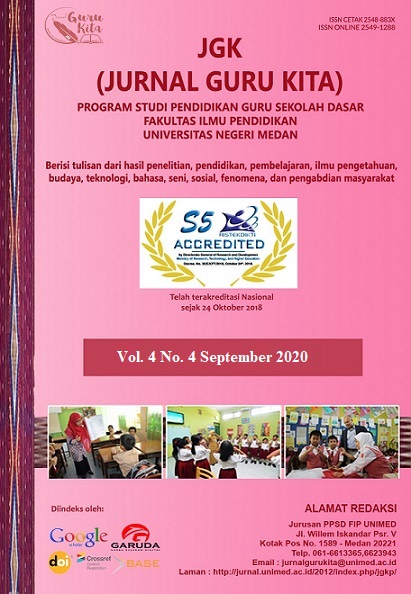KETERAMPILAN BERPIKIR KRITIS SISWA DI SEKOLAH DASAR DENGAN MENGGUNAKAN KURIKULUM 2013
DOI:
https://doi.org/10.24114/jgk.v6i3.33555Keywords:
Keterampilan Berpikir Kritis, Kurikulum 2013, Metode Kualitatif.Abstract
Abstract: The use of the 2013 curriculum is indeed designed to improve students' critical thinking skills in elementary schools. The teacher acts as a facilitator while the students play a more active role in the class. This article is intended for teachers who are looking for more information about the 2013 curriculum. In this article, the author uses a qualitative method which is carried out by questionnaires and literature studies. A questionnaire or questionnaire is a questionnaire or indirect data collection (this research does not directly ask and answer questions with respondents). The data obtained by the author is then processed to become an appropriate article.Keywords: Critical Thinking Skills, 2013 Curriculum, Qualitative Method.Abstrak: Penggunaan kurikulum 2013 ini memang didesain untuk meningkatkan keterampilan berpikir kritis siswa di sekolah dasar. Guru berperan sebagai fasilitator sedangkan siswa yang berperan lebih aktif di kelas. Artikel ini ditujukan untuk guru yang sedang mencari informasi lebih mengenai kurikulum 2013. Pada artikel ini, penulis menggunakan metode kualitatif yang dilakukan dengan angket dan studi literatur. Angket atau kuisioner adalah angket atau pengumpulan data secara tidak langsung (penelitian ini tidak langsung bertanya jawab dengan responden). Data yang penulis peroleh tersebut kemudian diolah hingga menjadi artikel yang sesuai.Kata kunci: Keterampilan Berpikir Kritis, Kurikulum 2013, Metode Kualitatif.References
Daryono. SIAP MENYONGSONG KURIKULUM 2013. Cetakan 1, PENERBIT GAVA MEDIA, 2013.
Sudarsana, I. K. (2018). Optimalisasi Penggunaan Teknologi Dalam Implementasi Kurikulum Di Sekolah (Persepektif Teori Konstruktivisme). Jurnal Ilmu Pendidikan, 1(1), 8“15. Retrieved from http://jayapanguspress.penerbit.org/index.php/cetta/article /view/41
Bogor, U. D., Tol, J., No, C., Pos, K., & Bogor, C. (n.d.). Pengaruh Model Pembelajaran Kooperatif Tipe Jigsaw Terhadap Kemampuan Berpikir Kritis Kelas V the Influence of Jigsaw Cooperative Learningtype on Ability of Critical Thinking of Grade V.
(Yusuf, 2018)Bogor, U. D., Tol, J., No, C., Pos, K., & Bogor, C. (n.d.). Pengaruh Model Pembelajaran Kooperatif Tipe Jigsaw Terhadap Kemampuan Berpikir Kritis Kelas V the Influence of Jigsaw Cooperative Learningtype on Ability of Critical Thinking of Grade V.
Yusuf, M. (2018). Peningkatan Keterampilan Berpikir Kritis dan Hasil Belajar Siswa SD dengan Menerapkan Strategi Everyone Is A Teacher Here pada Model Pembelajaran Kooperatif. Jurnal Ilmiah Sekolah Dasar, 2(1), 18. https://doi.org/10.23887/jisd.v2i1.13706
Downloads
Published
How to Cite
Issue
Section
License
Authors published with the JGK (Jurnal Guru Kita) agree to the following terms:
- Authors retain copyright and grant the journal the right of first publication with the work simultaneously licensed under a Creative Commons Attribution License (CC BY-SA 4.0) that allows others to share the work with an acknowledgment of the work's authorship and initial publication in this journal.
- Authors are able to enter into separate, additional contractual arrangements for the non-exclusive distribution of the journal's published version of the work (e.g., post it to an institutional repository or publish it in a book), with an acknowledgment of its initial publication in this journal.
- Authors are permitted and encouraged to post their work online (e.g., in institutional repositories or on their website) prior to and during the submission process, as it can lead to productive exchanges, as well as earlier and greater citation of published work. (See The Effect of Open Access)


























